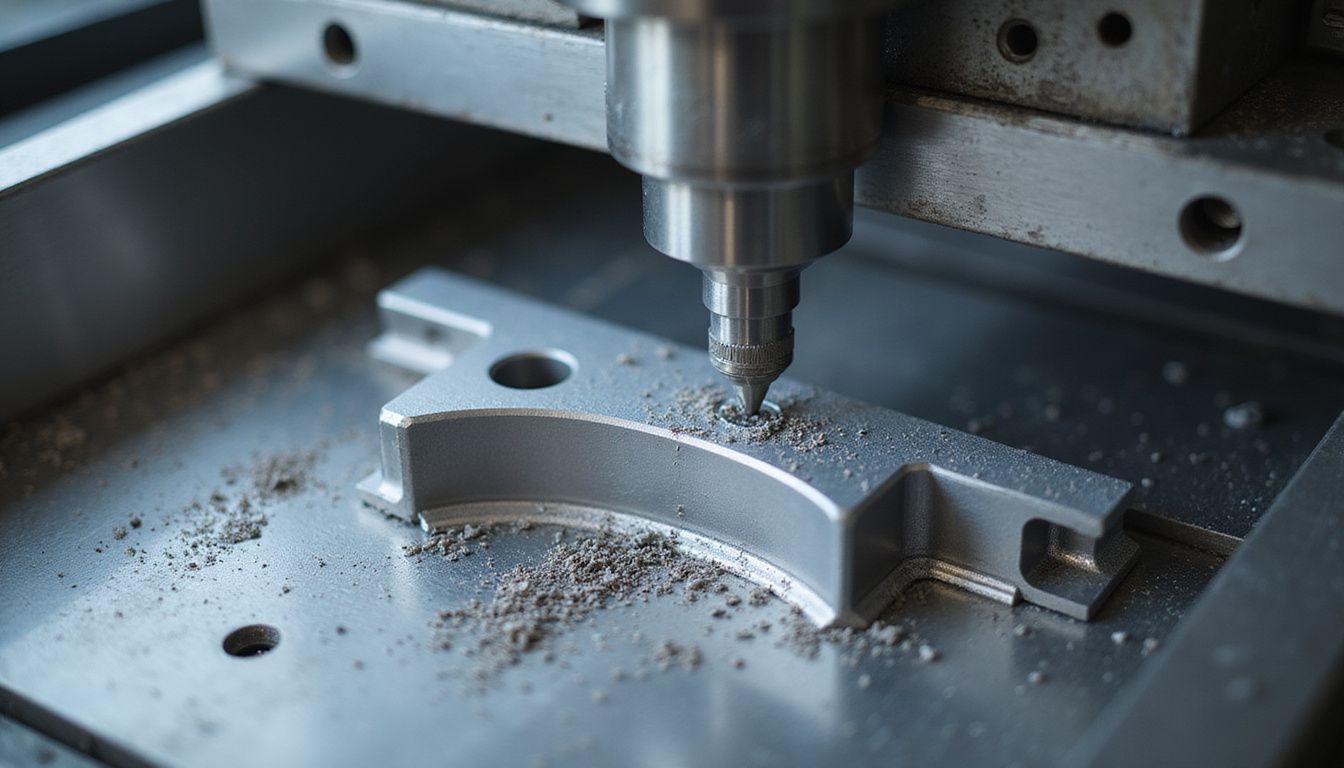
Titanium vs. Steel: Which Should You Use
I've machined both titanium and steel for over a decade. These metals shape industries like aerospace and automotive. But choosing between them? It boils down to your project's needs—strength, weight, or cost. Today, I'll break down titanium vs. steel to help you decide.
In this post, I'll cover their core properties, seven key differences, machining challenges, real-world applications, and tips for selection. You'll gain insights to optimize your manufacturing. Let's dive in and find the right fit for your precision parts.
What Defines Titanium for Machining?

Titanium stands out for its lightweight strength. I love it for high-stakes projects. Density sits at 4.5 g/cm³—nearly half of steel's. This makes parts easier to handle and fuel-efficient.
Its tensile strength reaches 900 MPa in alloys like Ti-6Al-4V. But low thermal conductivity traps heat during cuts. That demands sharp tools and coolants. Titanium forms a passive oxide layer for top corrosion resistance.
Biocompatibility shines in medical uses. It resists body fluids without reactions. Cost? Expect $35-50 per kg. Worth it for performance-critical jobs.
Understanding Steel's Core Properties
Steel offers reliability and versatility. I've relied on it for structural builds. Density averages 7.8 g/cm³—heavier but stable. Tensile strength varies from 400 to 2,000 MPa across grades.
Carbon steels harden well for tools. Stainless types fight rust in harsh environments. Thermal conductivity spreads heat evenly. This eases machining and cuts tool wear.
At $1-1.50 per kg, it's budget-friendly. Elasticity absorbs shocks better than titanium in some cases. Ideal for everyday durability.
7 Key Differences: Titanium vs Steel Strength

Strength isn't just numbers—it's about application. Titanium edges out in weight-adjusted power. Steel dominates raw force. Let's unpack seven differences with data.
Weight and Density Comparison
Titanium weighs 4.5 g/cm³. Steel hits 7.8-8.9 g/cm³. That's 45% lighter for titanium. In aerospace, this slashes fuel use by up to 10%.
I see it in engine parts. Steel suits heavy loads where weight doesn't matter.
Corrosion Resistance Breakdown
Titanium's oxide layer blocks corrosion—even in saltwater. Rate? Under 0.01 mm/year. Steel corrodes at 0.01-0.02 mm/year without coatings.
For marine apps, titanium lasts decades. Steel needs paints or alloys to compete.
Hardness and Durability Insights
Steel boasts Rockwell C hardness of 20-65. Titanium? 20-40. Steel wears tools less in bulk runs. But titanium's fatigue resistance endures 10 million cycles—double steel's in some tests.
Durability favors titanium in vibrations. Steel excels in impacts.
Cost Factors in Manufacturing
Titanium costs 20-50 times more than steel. Processing adds 3-5 times the raw cost. Steel's low price scales production.
Budget projects pick steel. Premium ones justify titanium's premium.
Strength-to-Weight Ratio Edge
Titanium's ratio beats steel by 30-40%. Yield strength per kg? Titanium at 800 MPa vs. steel's 500 MPa equivalent. Perfect for weight-sensitive designs.
Steel packs absolute strength for bridges or frames.
Thermal and Fatigue Performance
Titanium handles 600°C without softening. Steel warps at 500°C. Fatigue? Titanium resists cracks 2x longer in cyclic loads.
I use titanium for hot zones. Steel for steady heat.
Biocompatibility and Elasticity
Titanium bonds with bone—zero rejection in implants. Steel risks reactions. Elastic modulus? Steel at 200 GPa, titanium at 110 GPa—more flexible.
Medical favors titanium. General use leans steel.
Machinability Challenges: Titanium vs Steel
Machining defines feasibility. Titanium fights back. Steel flows smoother. Here's why.
Tool Wear and Heat Management
Titanium's low conductivity keeps 80% heat at the tool edge. Wear rate? 3-4x steel's. Use carbide tools with coatings.
Steel dissipates heat fast. I cut tool life worries by half with it.
Speed and Precision Tolerances
Titanium speeds top at 30-60 SFM. Steel hits 200+ SFM. Work hardening grips tools in titanium—slow feeds prevent it.
Precision? Both hold ±0.001 inches. But titanium's springback needs extra passes.
Applications: Titanium vs Steel in Industries

Real parts tell the story. Titanium lifts performance. Steel grounds it affordably.
Aerospace and Medical Precision Parts
Aerospace uses titanium for 50% weight savings in frames. Medical? 90% of implants are titanium for biocompatibility.
I machine turbine blades in titanium. Steel stays out of implants.
Automotive and Structural Components
Automotive picks steel for chassis—handles 1,000 MPa crashes. Structural beams? Steel's cost wins at scale.
Titanium appears in exhausts for heat. Steel dominates frames.
How to Choose Titanium or Steel?
Selection starts with specs. I assess load, environment, and wallet first.
Weighing Project Needs and Budgets
Lightweight critical? Go titanium. High volume, low cost? Steel.
Budget under $10k? Steel. Over? Titanium pays off long-term. Test prototypes—I always do.
Standard Machining's Titanium Expertise
At Standard Machining, we specialize in CNC titanium work. Our 5-axis mills handle tight tolerances. Fast turnarounds keep your projects on track.
We've delivered 1,000+ titanium parts yearly. Trust us for quality without delays.
Conclusion: Optimal Material Match
Titanium suits high-performance needs. Steel fits everyday strength. Match your goals to unlock efficiency. Your project deserves the best.
Ready for precision machining? Contact Standard Machining today. Let's craft parts that exceed expectations—quote in 24 hours.
FAQs: Titanium vs Steel Queries
Is Titanium Stronger Than Steel?
Yes, by weight. Titanium's strength-to-weight ratio tops steel by 30%. Raw strength? Steel often wins. As a machinist, I pick based on density needs.
Which Is Easier to Machine: Titanium or Steel?
Steel. It machines 3-4x faster with less heat. Titanium demands expertise. Our team at Standard Machining masters both for flawless results.
Why Is Titanium So Expensive Compared to Steel?
Extraction and processing cost 20-50x more. But it lasts longer in corrosion zones. Value justifies it for aerospace pros.
Can Titanium Replace Steel in Automotive Parts?
Sometimes. In engines, yes—for weight cuts. Frames? No, steel's cost and strength rule. Evaluate your specs carefully.
Is Titanium Biocompatible for Medical Use?
Absolutely. It integrates with tissue without issues. Steel can irritate. Backed by decades of implant success, it's the gold standard.

